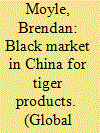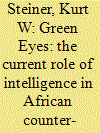| Srl | Item |
| 1 |
ID:
087465


|
|
|
|
|
| Publication |
2009.
|
| Summary/Abstract |
Poaching of tigers is a major threat to the survival of the species. China is responsible for much of the demand for tiger parts. Poaching occurs because it is profitable and organizations able to procure transport and sell tiger products over thousands of miles and international borders also exist. Unfortunately there is little corresponding data on these organizations. It appears as if these organizations operate to minimize the most significant transaction cost along the supply chain. Tigers are a minority element in a portfolio of wildlife products assembled by smugglers in range states. Within China smugglers specialize in the skins and bones of tigers, and are most likely to operate in small, discrete groups. This is a function of the high coordination and evasion costs of operating in China. The demand for tiger parts has strong cultural and medicinal influences.
|
|
|
|
|
|
|
|
|
|
|
|
|
|
|
|
| 2 |
ID:
158977


|
|
|
|
|
| Summary/Abstract |
The rhino is going extinct due to poaching at a rate which far outstrips current law enforcement or conservation efforts to halt their decline. A critical aspect of counter-poaching failures to date is an inaccurate view of the nature of poaching as a crime. Rather than demand-side efforts, attacking elusive smuggling networks or expensive technical solutions like drones, this article notes how a quasi-military tactical approach of ‘combat tracking’ offers the best way to protect the species. Based on wide ranging interviews and fieldwork across dozens of parks in southern Africa, it demonstrates how the current restricted range of the rhino, and the rarity of skilled poachers, makes a tactical solution the most effective to date.
|
|
|
|
|
|
|
|
|
|
|
|
|
|
|
|
| 3 |
ID:
173195


|
|
|
|
|
| Summary/Abstract |
Intelligence is a practice that is becoming more frequently used within the conservation industry. This article examines the question of what role intelligence currently plays in counter-poaching within Protected Areas in Africa. Through research into existing literature, combined with interviews conducted in the field with practitioners active in 19 countries, it concludes that while intelligence practices have been randomly adopted by various conservation organisations in the past, and are currently being applied with varying degrees of success, they are fast becoming more professionalised and more effective.
|
|
|
|
|
|
|
|
|
|
|
|
|
|
|
|
| 4 |
ID:
123458


|
|
|
|
|
| Publication |
2013.
|
| Summary/Abstract |
Africa's wildlife is in danger. The last couple of years have been disastrous for the African elephant as poaching for ivory reached record numbers. Rhinos have been hit hard with several sub-species becoming extinct. The current anti-poaching and anti-trafficking operations lack the sophistication and determination that is found abundantly within criminal organisations immersed in this illicit trade. Terrorism, rebellious elements and corrupt officials all benefit from the destruction of Africa's eco-system and the inaction or lack of efficient action thereof by law enforcement officials. This commentary suggests new courses of action using methods from the fields of counter-terrorism and special operations.
|
|
|
|
|
|
|
|
|
|
|
|
|
|
|
|
| 5 |
ID:
097713


|
|
|
|
|
| Publication |
2009.
|
| Summary/Abstract |
This article aims to broadly outline the most salient dimensions of the illegal ivory trade in Africa, from poaching for profit to that used to fund conflict, those involved, their methods and means. The rise in poaching has coincided with a greater level of organisation and sophistication in the illegal trade in ivory and is associated with a growing demand for ivory in Asia, especially China. Beyond mere criminal enterprise, however, this mushrooming illegal trade is also aiding in funding conflict and instability on the continent.
|
|
|
|
|
|
|
|
|
|
|
|
|
|
|
|